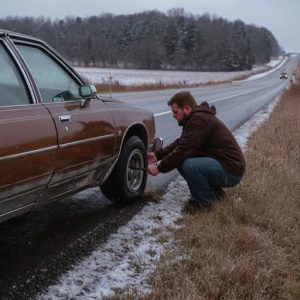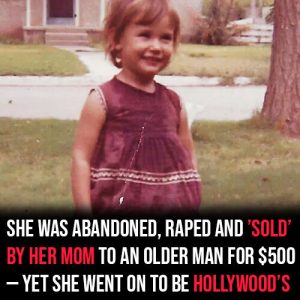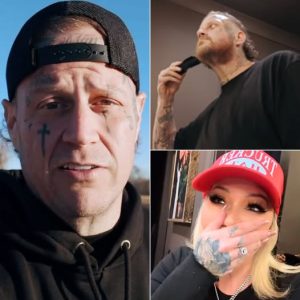A 73‑year-old veteran lies in a hospice room, frail and nearing the end of his life. After his wife’s death, the children he raised slipped away, leaving him in emotional isolation even as his body weakens. He reflects on a life of sacrifice: long nights doing double shifts, missing holidays, working hard so his children could have a better future. Yet now, when he needs them most, their absence echoes louder than any illness. His Purple Heart — a symbol of his courage and service — has become his only tangible proof that he once mattered to someone, even if his own family would not come.
His world changes unexpectedly when Marcus, a rough but gentle biker with a silver beard, knocks on his door — by mistake. Seeing the Purple Heart around the veteran’s neck shifts Marcus’s demeanor: he listens with deep respect and asks about the veteran’s children. When he learns they haven’t visited, Marcus seems genuinely angry. Despite the veteran’s skepticism, Marcus returns the next day with real coffee and takes a seat beside him, calling him “brother” — a term that stings sweetly, because it’s something the veteran hasn’t heard from his biological children in years.
Marcus doesn’t come alone. He brings his biker community — fellow veterans, firefighters, wanderers — people who understand sacrifice and loneliness. Their arrival transforms the sterile hospice room into a place of warmth. They tell stories, laugh, and treat him with genuine honor: not as a dying man, but as a warrior. Through their presence, the veteran rediscovers a sense of belonging and dignity. These new friends don’t see him as a final duty — they show up because they choose to, because he deserves to be seen.
One night, Marcus gently asks the veteran what he wants to leave behind. The veteran thinks of the will he wrote years ago, leaving everything to children who never cared. But now, with Marcus’s support, he calls a lawyer and rewrites his legacy. Instead of leaving his property to his estranged kids, he dedicates it to shelters, hospice care, and services for overlooked veterans. To his children, he leaves letters — honest but not bitter — telling them he loved them, waited for them, and hoped they might remember him, but also that he found another family in the biker brotherhood.
On his last morning, Marcus arrives again, quietly, holding the veteran’s hand as others gather. The brotherhood rides in on motorcycles, forming a circle around his bed, offering tokens of respect: an American flag, wildflowers, a handmade box. Their solemn motorcycle tribute fills the hospice parking lot with reverence. A lawyer returns to tell him his letters were delivered — one daughter cried on reading hers, a small solace in his final hours. As the sun sets, Marcus leans close and tells him that he will not be forgotten — that he is a warrior whose story will live on in those who loved him. Surrounded by respect, loyalty, and genuine affection, the veteran slips peacefully away.
Afterward, the biker brotherhood organizes a striking funeral: dozens of riders roll in formation, joined by veterans and townspeople, all coming to honor a man most people never knew in life. His children attend, grief and humility heavy on their faces, but there’s no anger from the bikers — just quiet condolences. His legacy lives on through the “Michael Grant Veteran Dignity Fund” (named for him), which supports hospice care, shelters, and aid for veterans who might otherwise die alone. Each year, the brotherhood visits his grave. In the end, the veteran learns — and teaches — that family isn’t just blood, but the people who show up, who see you, and who carry your story forward.



